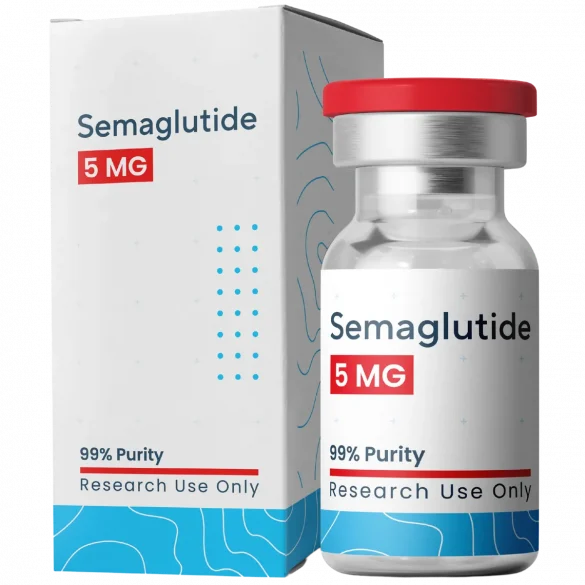Is Semaglutide Safe? What You Need to Know

Semaglutide, a drug that is gaining popularity for its effectiveness in managing blood sugar levels and promoting weight loss, is drawing both interest and concern.
As more people choose semaglutide to manage their health or just dream of getting that treasured prescription, understanding the potential risks and benefits is more important than ever.
In this article, we’ll tell you everything you need to know about semaglutide– from how it works to its potential risks and benefits, to help you make an informed decision about its use.
What is Semaglutide?

Semaglutide is an FDA approved medication that helps people with Type 2 diabetes manage their blood sugar levels. Semaglutide belongs to a group of drugs known as glucagon-like peptide-1 (GLP-1) receptor agonists. This means it mimics a human hormone that helps lower blood sugar levels after eating by increasing insulin production.
Injectable semaglutide is also used to treat obesity, as it suppresses appetite. Health care professionals prescribe it for weight loss to people with BMI of greater than 30 kg/m2 or 27 kg/m2 or greater with at least 1 weight-related condition such as high blood pressure or diabetes.
When patients combine their treatment with diet and exercise, they can lose up to 20% of their body weight, let alone greatly improve their health.
FDA Approved Semaglutide Products
There are three medications that contain semaglutide as an active ingredient: Ozempic and Wegovy, which are semaglutide injections, and Rybelsus, which is oral semaglutide. All of these are approved by the FDA, Food and Drug Administration.
Ozempic and Rybelsus are used to treat type 2 diabetes and reduce the risk of heart attack, while Wegovy is designed for people who need obesity treatment. To get any of these branded medications you would usually require a prescription from a doctor.
How Does Semaglutide Work?
Blood Sugar Management
Managing blood glucose levels is crucial for diabetic patients as high blood sugar can lead to serious health problems like heart disease and kidney damage.
Semaglutide works by making your body produce more insulin when blood sugar levels are high.
Weight Loss
Semaglutide slows down gastric emptying (which means how fast food leaves your stomach) and reduces appetite. This helps you eat less and lose weight more effectively.
This benefit made it a popular choice for people with obesity, especially when combined with diet and exercise.
What Are the Risks of Using Semaglutide?
Even though this medication has many benefits, it’s important to know about the possible risks and unwanted effects.
Thyroid Cancer and Tumors

In earlier animal studies, semaglutide showed an increased probability of thyroid tumors. While this hasn’t been proven in humans, it’s still something to keep in mind.
The FDA has included a black box warning, and patients are advised to see a doctor if they notice any symptoms like a lump in their neck.
However, in 2023 the European Medicines Agency’s (EMA) Pharmacovigilance Risk Assessment Committee examined available evidence from previous studies and determined that there’s no association between GLP-1 agonists and cancer of the thyroid.
Acute Kidney Injury

Although it’s rare, some patients have experienced kidney problems after starting semaglutide, especially those who already had kidney issues or were dehydrated.
Diabetic Retinopathy

Earlier studies suggested that semaglutide could worsen diabetic retinopathy in people with diabetes. However, recent research shows that semaglutide is not associated with an increased chance of diabetic eye disease.
Gastrointestinal Issues
The most common semaglutide side effects are gastrointestinal, including nausea, vomiting, diarrhea, or constipation. These side effects are usually mild and get better as your body adjusts to the medication.
Most people can manage these effects with anti nausea or anti vomiting medications. However, for some patients, these symptoms can be severe enough to stop taking the drug.
Allergic Reactions

Some people have had allergic reactions to semaglutide. Symptoms can include rash, itching, swelling, and difficulty breathing. If you think you’re having an allergic reaction, get medical attention immediately.
Compounded Semaglutide: Is It Safe?

Compounded versions of semaglutide are custom-made versions of the drug prepared by compounding pharmacies. These are not approved by the FDA.
Compounded semaglutide offers more dose flexibility compared to the branded versions, allowing patients to tailor dosages that can better meet their needs.
Additionally, compounded semaglutide is often more affordable, making it an attractive alternative for many people.
In some cases, you may not need a prescription to buy compounded semaglutide.
Beware Of Salt Formulations

Not all compounded semaglutide products are the same. Some products sold as “semaglutide” may not contain semaglutide at all, or may be mixed with different salt formulations like semaglutide acetate or semaglutide sodium. These versions differ from the FDA approved semaglutide products in terms of how they work in the body, which could lead to adverse events.
However, many compounding pharmacies do not use semaglutide salts, and only use the same active ingredient as in branded versions. When compounded correctly, these versions can provide the same benefits as the medications approved by the FDA.
Quality and Safety Considerations

Compounded semaglutide can be a good alternative, but there are still some risks to consider.
Compounded drugs are not regulated as strictly as FDA approved medications. This means that the quality, potency, and sterility can vary from one pharmacy to another.
To minimize these risks, choose a reputable compounding pharmacy that follows quality standards and meets federal requirements.
Why Compounded Semaglutide Might Be Right for You

If you’re looking for a more flexible dosing option or a less expensive alternative to branded semaglutide products, you might want to consider compounded semaglutide.
When obtained from a reputable compounding pharmacy that follows strict quality standards, compounded semaglutide can be just as effective as the branded versions.
Who Should Avoid Semaglutide?

Some people should avoid using it. These inlcude:
People with a history of thyroid cancer or multiple endocrine neoplasia syndrome type 2 (MEN 2)
Pregnant or breastfeeding women
Anyone with severe allergies to semaglutide or its ingredients
Final Thoughts

Semaglutide is an FDA approved GLP-1 analog medication for weight loss and diabetes treatment. This drug is safe for most people when used correctly. However, it’s not without health risks, and some people should avoid it.
The key to using semaglutide safely is to stay informed about the contraindications, side effects, safety issues and follow your doctor’s advice. If you do that, this GLP-1 medication can be a powerful tool in improving your health.
Remember, it’s always important to weigh the benefits against the risks and make the best decision for your health.
Shop Semaglutide
Semaglutide 2 mg
A vial of 2 mg of lyophilized (freeze-dried) semaglutide.
$180.00














